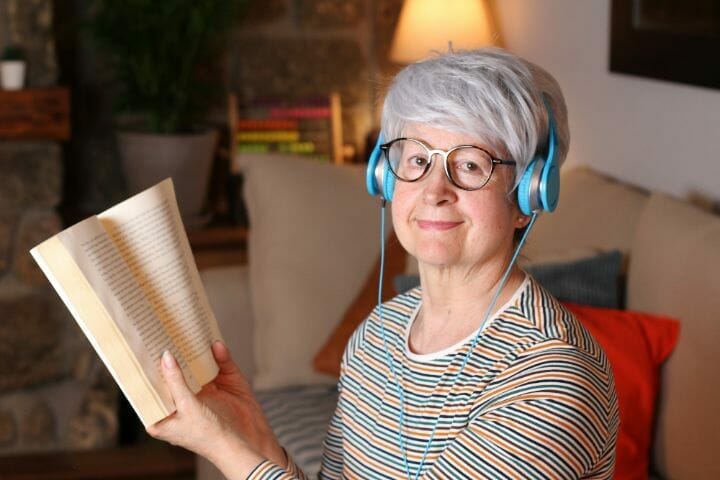It is unfortunate when our twilight years are not the enjoyable relaxing time of our life that we had anticipated and worked hard for. Often various physical and mental conditions take hold of our body and take their toll on us, preventing us from leading a peaceful and healthy life.
The truth is that the chances of these conditions can often be minimized by leading a healthy lifestyle in the prime years of our lives. However, by the time we understand and appreciate this, it may be too late in the day.
Contents
What is Agitation and How Does it Manifest Itself
Agitation may manifest itself in many ways – anxiety, irritability, restlessness or short tempered behavior, excessive talking, being upset for no apparent reason or by a combination of a physical act of pacing and mental anxiety.
It mostly leads to situations of hyper-ventilation or hyperactivity or aggression for the elderly affected person. It affects one’s ability to focus and over a period of time affects one’s relationships and social life, performance at work, and one’s safety and overall well-being.
Agitation is a major cause of lifestyle disruption in the elderly. And it never takes hold of your mind on its own. Agitation is always the effect. It is an extraordinarily complex mental syndrome that is associated with multiple physical and mental disorders or conditions.
When it appears in your behavior for the first time, it is time to diagnose the actual cause behind that behavior. Unfortunately, it is often a complex task: to find what is at the root of agitated behavior – unless you have a clear history of physiological or psychiatric conditions.
You may also like How to Bathe an Elderly Person in Bed?
How Agitation Affects One’s Ecosystem
Not only does agitation cause problems for the affected, it is also a cause of concern for the caregiver or attendant. The caregiver must be extra vigilant and patient with the affected person – because the smallest of things may trigger an episode of agitated behavior.
It is also often very worrisome for other family members. If you have children in your house, it is important that you keep children away as much as possible from behavior that is abnormal, to prevent any unwanted effects on them.
Medical Causes of Agitation in the Elderly
Though it is too late probably, in some of these cases, to find a permanent cure, it is often helpful to understand the diagnosable condition behind the onset of agitated behavior. Agitation can be caused by a wide array of conditions, which affect the elderly much more adversely than the able-bodied individual.
Some psychiatric disorders like
- Dementia: Dementia is an umbrella word for everything to do with brain disorders – be it loss of memory, severe loss of thinking and problem-solving ability. These conditions are severe enough to hamper your daily activities and this will manifest itself in agitated behavior
- Psychosis: These are disorders that lead you to experience sensory perceptions that actually do not exist. Therefore, you hear or see something which is not the reality and so may react to your feelings in sub-optimal ways, including agitation and irritability
Some physically debilitating diseases or conditions like
- Stroke: A stroke may lead to a continued lack of blood flow to your brain and may lead to conditions like dementia. In general, a stroke affects the blood flow to the brain and the brain decides your behavioral patterns. Agitation is often a side effect of stroke 20 – 30% of the time.
- Brain Injury: Severe head injury or brain injury often leads to emotional disruption or mental confusion. This confusion will almost always lead to agitated behavior.
- Arthritis: Arthritis can be a continuous source of pain for the elderly. And this constant pain often manifests itself as agitation.
- Endocrine Diseases: Problems of the endocrine system may result in unexpected changes in the nervous system. Problems related to thyroid, hormone levels, pituitary gland, can all result in manifestations in the form of irritable behavior.
- Hearing Loss: Hearing loss disrupts your social life or your ability to keep yourself busy. Not being able to participate socially as before or not being able to perform simple things like watching the television may lead to irritability and agitation.
You may also like How to Help an Elderly Parent Who Refuses Help
Side Effects of Medicine
Finally, your agitated behavior can just be the side effect of your medication, and then it is good news actually. Unless your medication is extremely rare (and protected by pharma exclusivity) and does not have any alternative, you can always consult your physician and find a way to reduce the side effects.
However, it is likely, that such strong medication was administered to mitigate a severe health problem and it is debatable how much you should tamper with the medication to reduce agitation.
Also, in some instances like these, it is extremely difficult to pinpoint the actual cause behind the behavior and it is probably not advisable to experiment with the medication too much.
Physical or Environmental Causes of Agitation – In Your Control
The physiological cause, like those we have outlined above, are situations that we will not be able to alter. Agitation in the elderly, however likely you are to experience it, is always triggered by certain physical experiences or environmental changes.
These situations, therefore, though cannot be completely minimized, can be reduced to a large extent by studying the patient and taking precautionary or preventive steps. Sometimes, for the elderly, that extra touch of care and compassion will go a long way in reducing these episodes.
Physical discomfort
Returning or recurrent acute physical discomfort or pain is a major cause of agitation or anxiety. It is important for you, as a caregiver, to understand the source of this discomfort and act accordingly.
For example, if arthritis causes returning severe pain every evening or especially during cold weather, it is worthwhile to take the help of medication or a warm press, a while before the anticipated bout of discomfort or pain.
What this effectively does, is that it takes away the inflection point of the pain by reducing it before it reaches the trigger zone. It comforts the elderly patient and makes him feel cared for; it goes a long way to reassure him.
If the pain does not have a pattern, it is worthwhile for you to keep a close tab on her and be alert to any signs of aggravating pain. On the first sign, you should administer either medication for the pain or a hot press to reduce the pain and soothe her nerves.
You may also like How to Get Guardianship of an Elderly Parent?
Environment
The elderly are sometimes extremely sensitive to changes in the environment – like too much light or loud sounds or noisy environments. They will always have a stable favorite environment that they would want to continue in.
It gives them a sense of reassurance or a comfort zone. As a caregiver, it is your responsibility to ascertain the tolerance levels for light or sound or other environmental factors.
Keep a tab on the ambiance and be alert to sudden changes. Try to proactively reduce the effects of such changes as much as possible. For example, when you anticipate loud noises outside your home, provide noise cancellation headphones to her and let her listen to soothing music.
If the light is too bright ask her to use a pair of sunglasses; These are small things but done at the right time, they really make a lot of difference. The only requirement is, as a caregiver, you should be very alert to the needs of your patient.
- Change of residence: This is the most common reason for substantial change in environment for the elderly. Often their children are moving to a new home and they must tag along. You should take extra care to align the new room as much to the old one as possible so that there is minimum environmental disruption. Try and simplify daily tasks and routines as much as possible to avoid triggers.
- Hospitalization: Hospitalization creates anxiety and change in surroundings. Try to be with her as much as possible and be allowed by authorities.
- House Guests: House parties or house guests and the accompanying increase in noise level is often a source of irritation for the elderly, but it is also something that probably may be reduced, but not totally avoided. Your caregiver should take the necessary steps to insulate the patient as much as possible from the increased activity.
Change in Care Giver
Sometimes a patient would get comfortable with a particular caregiver and may throw child-like tantrums following a change in caregiver arrangements. It is important for you to keep this in mind and arrange for a caregiver who can commit for the long term and it is best to hire somebody with good references.
Other common reasons are alcohol use, threats that are misperceived, hallucinated dangers or just getting fatigued trying to make sense of the daily happenings. You must try to get to the root cause and remove the source of anxiety as much as possible.
Your Best Response to Agitated Behavior
A great way to stay calm and to be able to respond with the most optimal solution is for you to be able to put yourself in the shoes of the patient. The elderly are often as young children and you need to cater to their every need.
In times of agitated behavior, you must be patient and reassure her, and listen to her to identify the root cause of the agitation. Sometimes distraction tactics work much like the way in the case of children.
Keep a note of the root cause and enter it in your diary. This will enable you to proactively prevent the next potential occurrence.
You may also like How to Help Elderly Parents From a Distance?
Medication for Controlling Agitation
Medication should be considered to control agitation in the elderly as the last resort. The elderly, on average, are already under the effect of a barrage of medicines and further medication is not the right way to treat agitated behavior unless the severity of the behavior is very high.
If it is likely to cause physical harm to self or caregiver or to family members, you may consult the physician for sedatives / anti-depressants / medicines which treat paranoia & confusion, which will provide immediate comfort to the patient.
Conclusion
Often, as sad as it may sound, agitated behavior becomes a way of life for the elderly. But if one is in the middle of loving family members or a well-trained professional caregiver, it makes a lot of difference to one’s life.
The target for any caregiver for the elderly should be to carefully understand the cause of such behavior and patterns of such behavior and try to intervene at the right moment or to create an environment that will calm down the affected person.
Preventive steps or precautionary measures go a long way to reduce the incidences of agitated behavior and help make the most of the twilight years in the elderly.



